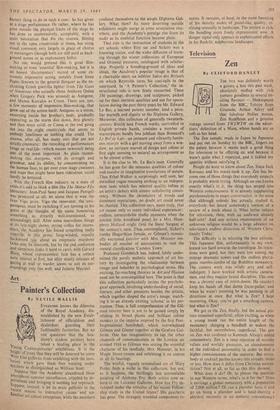Television
Zen
By CLIFFORD HANLEY
THE box was definitely worth a guinea a box this past week, absolutely stuffed with rich yummy goodness in several ex- citing flavours — Shakespeare from the BBC, Tolstoy from Granada, Arthur Askey and that fabulous Italian mouse, Zen Buddhism and a genuine vintage morsel-from TWTWTW on the adver- tisers' definition of a Mum, whose hands are as soft as her head.
The Zen sample, made in Japan by Japanese and put out on Sunday by the BBC, lingers on the palate because it seems such a good thing for television to be offering us; and because it wasn't quite what I expected, and it tickled my appetite without satisfying it.
People do want to know about Zen. Since Jack Kerouac and his mates took it ,up, Zen has ,be- come one of those things that everybody suspects is probably worth trying. Although no one knows exactly what's in it, the thing has seeped into Western consciousness. It is already supplanting psychoanalysis in smart conversation, in the sense that although nobody has actually studied it, everybody has heard somebody's version of a review of a book about it. What better subject for television, then, with an audience already half-sold? And any serious examination of an unknown religion would be a large, advance on television's endless dissection of 'Western Chris- tianity Today.'
The difficulty is in selecting the best attitude. This Japanese film, unfortunately in my view, leaned too hard towards the travelogue. Its inten- tions were good, but they were lost among the strange dramatic noises and the endless photo- genic mumbo-jumbo of the Buddhist monastery, The camera work was wildly arty and self- indulgent. I have worked with artistic camera- men, and they require brutal discipline. This. one was a chronic case of zoom-doom. He couldn't keep his hands off .that.damn focus-puller, and when he wasn't zooming he was panning in all directions at once. But what is Zen? I kept muttering. Okay, you've got a smashing camera, but what is Zen?
We got to the Zen, finally, but the actual pic- ture remained superficial; often exciting, as when a young monk ran the entire length of the monastery clanging a handbell to waken the faithful; but nevertheless, superficial. The gen on Zen was confined to Kenneth Allsop's added commentary. Zen is a total rejection of worldly values and worldly pleasures, an abandonment of the individual personality in order to find a higher consciousness of the universe. But every- body at cocktail parties knows this already, more or less. How does it differ from Christian monas- ticism? Not at all, as far as this film showed.
What does it do? Or, to phrase the question in our Western terms, what's in it for me? Does it envisage a global monastery with a population of 2,000 million? Or can a plumber have it and go on being a plumber and is head-shaving a physical necessity or an aesthetic convenience?














































 Previous page
Previous page